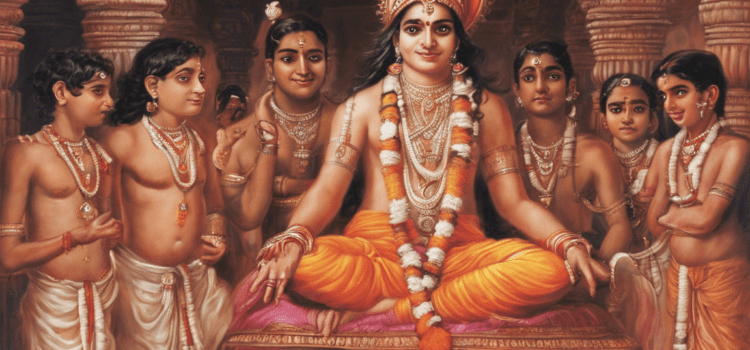Hinduism is one of the oldest and most diverse religions in the world, with a rich tapestry of beliefs, practices, and traditions. For those looking to explore the depths of Hinduism through the medium of Hindi, this beginner’s guide aims to provide a comprehensive overview of the key aspects of this complex and multifaceted religion.
इतिहास (History) of Hinduism:
Hinduism traces its origins back to the ancient Indus Valley civilization, with roots in the Vedic traditions that emerged in the Indian subcontinent over 4,000 years ago. The term “Hinduism” itself is a broad umbrella that encompasses a wide range of beliefs and practices, making it more of a way of life than a rigidly defined religion.
मूलभूत सिद्धांत (Basic Tenets) of Hinduism:
1. धर्म (Dharma):
Central to Hindu philosophy is the concept of dharma, which can be understood as one’s duty or righteous behavior. It encompasses moral, ethical, and societal obligations that guide an individual’s conduct in life.
2. संसार (Samsara):
Hinduism also upholds the belief in samsara, the cycle of birth, death, and rebirth. This cycle is governed by the law of karma, wherein one’s actions in past lives determine their current circumstances.
3. मोक्ष (Moksha):
The ultimate goal in Hinduism is to attain moksha, liberation from the cycle of samsara and the reunification with the divine. This liberation is achieved through spiritual realization and self-transcendence.
देवताएँ (Deities) in Hinduism:
Hinduism boasts a diverse pantheon of deities that represent various aspects of the supreme reality. Some of the major gods and goddesses include:
- ब्रह्मा (Brahma): The creator god.
- विष्णु (Vishnu): The preserver god.
- शिव (Shiva): The destroyer god.
- दुर्गा (Durga): The goddess of power and strength.
- लक्ष्मी (Lakshmi): The goddess of wealth and prosperity.
- सरस्वती (Saraswati): The goddess of knowledge and arts.
पुजा एवं उपासना (Worship and Meditation) in Hinduism:
Hindu worship practices are diverse, ranging from elaborate temple rituals to personal devotions at home. Puja involves offering prayers, flowers, incense, and food to the deities, accompanied by chants and hymns. Meditation, known as dhyana in Hindi, is also a key practice for spiritual growth and inner peace.
प्रमुख धार्मिक ग्रंथ (Sacred Texts) in Hinduism:
Hinduism is enriched with a vast literary heritage, with sacred texts that expound on philosophy, mythology, ethics, and spirituality. Some of the most important texts include:
- वेद (Vedas): The oldest scriptures of Hinduism, comprising hymns, rituals, and philosophical teachings.
- उपनिषद (Upanishads): Philosophical texts that explore the nature of reality and the self.
- भगवद गीता (Bhagavad Gita): A dialogue between Lord Krishna and Arjuna on duty, righteousness, and the nature of reality.
- रामायण (Ramayana): An epic narrative of the hero Rama and his quest to rescue his wife Sita.
- महाभारत (Mahabharata): One of the longest epic poems in the world, encompassing the Kurukshetra War and the teachings of Lord Krishna.
धार्मिक अदर्श (Religious Ideals) in Hinduism:
1. अहिंसा (Ahimsa):
The principle of ahimsa, or non-violence, is central to Hindu ethics. It advocates compassion and the avoidance of harm to all living beings.
2. सेवा (Seva):
The concept of seva, selfless service, underscores the importance of serving others without expectation of reward. It is a way to cultivate humility and contribute to the well-being of society.
3. ध्यान (Dhyana):
Meditation plays a significant role in Hindu spiritual practices, helping individuals focus their minds, cultivate inner peace, and connect with the divine presence within.
FAQ (Frequently Asked Questions) about Hinduism in Hindi:
1. क्या हिंदू धर्म एक धर्म है या एक धर्म संभावना?
हिंदू धर्म एक धर्म संभावना है जो विभिन्न श्राद्धांतिक विचारों, आचरणों और संस्कृतियों को एक साथ लेकर आता है।
2. क्या हिंदू धर्म में केवल एक ईश्वर होता है?
हिंदू धर्म में अनेक ईश्वरों की मान्यता है, जो सम्पूर्णता की विविधता को प्रकट करती है।
3. क्या हिंदू धर्म में मूर्ति पूजन की अनिवार्यता है?
मूर्ति पूजन हिंदू धर्म का महत्वपूर्ण तत्व है, लेकिन यह भक्ति को संवेदनशील रूप से जीने का एक माध्यम भी है।
4. क्या हिंदू धर्म में जन्म-मृत्यु का संचार सिद्धांत है?
हां, हिंदू धर्म में संसार, जिसे जन्म-मृत्यु का संचार कहा जाता है, का मान्यता है जिसमें कर्म का महत्वपूर्ण भूमिका है।
5. कौन-कौन से और कितने प्रकार के योग हैं हिंदू धर्म में?
हिंदू धर्म में प्रमुख रूप से ज्ञान योग, कर्म योग, भक्ति योग और राज योग के चार प्रमुख प्रकार के योग हैं।
6. क्या भगवद गीता केवल एक धार्मिक ग्रंथ है या जीवन के नियमों का मार्गदर्शन पुस्तक है।
भगवद गीता हमें जीवन के नियमों का मार्गदर्शन पुस्तक मानी जाती है जो हमें धार्मिक, नैतिक और आध्यात्मिक सिद्धांतों से अवगत कराती है।
उपसमाप्ति (Conclusion):
In conclusion, Hinduism is a profound and multifaceted religious tradition that offers a wealth of philosophical insights, ethical teachings, and spiritual practices. By delving into the core tenets, deities, scriptures, and ideals of Hinduism, one can embark on a transformative journey of self-discovery and inner growth. Embracing the diverse aspects of Hinduism in Hindi can deepen one’s understanding and appreciation of this ancient and enduring faith.
